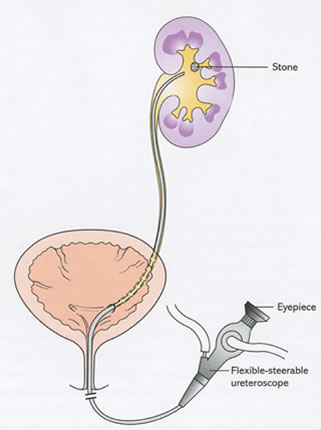Laser Surgery for Kidney Stones
What is it?
Ureteroscopy is where a long thin rigid telescope is introduced into the upper urinary tract via the bladder (see diagram). Flexible Pyeloscopy is where a thin fibre-optic telescope is introduced into the kidney. Micro-baskets, laser fibres and miniature jack hammer (pneumatic lithoclast) manipulates and fragments stones.
What are the main advantages of this approach?
- Generally considered a very safe procedure with minimal postoperative pain and return to normal activities after 24 hours.
- Allows stone treatment without the need for any incisions.
- A highly successful technique (over 90%).
- Can be performed as day/overnight surgery.

Laser Stone Surgery: Rigid Ureteroscopy & Flexible Pyeloscopy cont.
What are the risks and what should I expect after the operation?
- Expect some burning on passing urine (An over the counter medication Ural can reduce the stringing sensation during urination).
- Blood in urine and possible passage of small stone fragments can occur for a few days to a week.
- Infections – stones can harbour bugs and treatment of stones can precipitate an infection which is why Dr Menogue will usually give you antibiotics around the time of your surgery. Rarely the infections can be severe and require hospitalization in a high dependency area.
- Incomplete stone clearance/need for future procedures (5-10%) (For stones larger than 10mm, repeat procedures are often expected).
- Ureteric stent placement in most cases for a short period to ensure the kidney drains without risk of blockage from stone fragments, blood clot and swelling after operation (see information sheet on ureteric stents).
- Small risk of damaging the ureter (0.5%).
Follow-up
- You will be advised after surgery the necessary follow-up arrangements.
- You need to drink at least 8 glasses of water a day (2.5L/day).
- Simple analgesics such as Panadol and Nurofen are usually all that is required, occasionally stronger medication (e.g. Panadeine Forte) or medications for stent irritation may be necessary.
- You will not be able to drive for at least 24 hours given the general anaesthetic.
- Depending on your overall “stone burden” and pervious stone episodes, Dr Menogue may arrange 24-hour urinary studies and referral to a renal physician.
- ENSURE ARRANGEMENTS HAVE BEEN MADE TO REMOVE YOUR STENT AFTER YOUR SURGERY. THE STENT MUST NOT REMAIN IN PERMANENTLY
